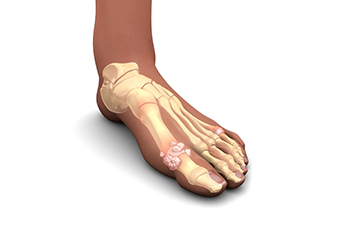Connect With Us
Blog
Items filtered by date: May 2025
Wounds That Don't Heal Need to Be Checked
Plantar Warts Can Cause Discomfort

Plantar warts are small, rough growths that appear on the bottom of the foot, usually on weight-bearing areas like the heel or ball of the foot. They are caused by the human papillomavirus, or HPV, which enters the skin through tiny cuts or cracks, often in places like public showers, gyms, or pool areas. Plantar warts may look like a callus, but often have a rough surface with black dots, which are tiny clotted blood vessels, at the center. The warts can be painful, especially while walking or standing, as pressure pushes them deeper into the skin. A podiatrist can diagnose plantar warts and offer effective treatments that go beyond over-the-counter options. These may include cryotherapy, topical acids, immune-boosting treatments, or minor surgical removal. Custom orthotics may also be recommended to reduce pressure on the area during healing. If you have a painful plantar wart, it is suggested that you schedule an appointment with a podiatrist for appropriate treatment.
Plantar warts can be very uncomfortable. If you need your feet checked, contact one of our podiatrists from Granite State Podiatry Associates. Our doctors will assist you with all of your foot and ankle needs.
About Plantar Warts
Plantar warts are the result of HPV, or human papillomavirus, getting into open wounds on the feet. They are mostly found on the heels or balls of the feet.
While plantar warts are generally harmless, those experiencing excessive pain or those suffering from diabetes or a compromised immune system require immediate medical care. Plantar warts are easily diagnosed, usually through scraping off a bit of rough skin or by getting a biopsy.
Symptoms
- Lesions on the bottom of your feet, usually rough and grainy
- Hard or thick callused spots
- Wart seeds, which are small clotted blood vessels that look like little black spots
- Pain, discomfort, or tenderness of your feet when walking or standing
Treatment
- Freezing
- Electric tool removal
- Laser Treatment
- Topical Creams (prescription only)
- Over-the-counter medications
To help prevent developing plantar warts, avoid walking barefoot over abrasive surfaces that can cause cuts or wounds for HPV to get into. Avoiding direct contact with other warts, as well as not picking or rubbing existing warts, can help prevent the further spread of plantar warts. However, if you think you have developed plantar warts, speak to your podiatrist. He or she can diagnose the warts on your feet and recommend the appropriate treatment options.
If you have any questions please feel free to contact our offices located in Manchester and Bedford, NH . We offer the newest diagnostic and treatment technologies for all your foot and ankle needs.
Ingrown Toenail Surgery and Its Benefits

An ingrown toenail occurs when the edge of a toenail grows into the surrounding skin, leading to pain, swelling, and sometimes infection. This condition most commonly affects the big toe and may result from improper nail trimming, wearing tight footwear, or injury. When conservative treatments like warm soaks or antibiotic ointments fail to relieve symptoms, ingrown toenail surgery may become necessary. The procedure involves removing part or all of the nail to prevent further discomfort and infection. It is a simple outpatient treatment that provides lasting relief for those who experience frequent or severe ingrown toenails. Recovery time is usually brief, with most individuals returning to normal activities within a few days. If you have an ingrown toenail, it is suggested that you promptly visit a podiatrist who can offer treatment options and assess the need for surgery.
Foot surgery is sometimes necessary to treat a foot ailment. To learn more, contact one of our podiatrists of Granite State Podiatry Associates. Our doctors will assist you with all of your foot and ankle needs.
When Is Surgery Necessary?
Foot and ankle surgery is generally reserved for cases in which less invasive, conservative procedures have failed to alleviate the problem. Some of the cases in which surgery may be necessary include:
- Removing foot deformities like bunions and bone spurs
- Severe arthritis that has caused bone issues
- Cosmetic reconstruction
What Types of Surgery Are There?
The type of surgery you receive will depend on the nature of the problem you have. Some of the possible surgeries include:
- Bunionectomy for painful bunions
- Surgical fusion for realignment of bones
- Neuropathy decompression surgery to treat nerve damage
Benefits of Surgery
Although surgery is usually a last resort, it can provide more complete pain relief compared to non-surgical methods and may allow you to finally resume full activity.
Surgical techniques have also become increasingly sophisticated. Techniques like endoscopic surgery allow for smaller incisions and faster recovery times.
If you have any questions please feel free to contact our offices located in Manchester and Bedford, NH . We offer the newest diagnostic and treatment technologies for all your foot and ankle needs.
Can Gout Affect Children and Teenagers?

Although gout is more common in adults, children and teenagers can develop it, especially if they have certain medical conditions or a family history. Gout is a form of arthritis caused by high levels of uric acid in the blood, which can form painful crystals in the joints. It often affects the big toe, and can produce excruciating pain. In younger individuals, it may be linked to kidney problems, obesity, or inherited disorders. Symptoms include joint pain, redness, and swelling, often in the big toe. Avoiding gout in children and teens involves maintaining a healthy weight, staying hydrated, and eating a balanced diet that limits high-purine foods such as red meat and sugary drinks. If your child has pain in the big toe, it is suggested that you promptly contact a podiatrist who can accurately diagnose gout, and offer relief and treatment solutions for this painful condition.
Gout is a painful condition that can be treated. If you are seeking treatment, contact one of our podiatrists from Granite State Podiatry Associates. Our doctors will treat your foot and ankle needs.
What Is Gout?
Gout is a form of arthritis that is characterized by sudden, severe attacks of pain, redness, and tenderness in the joints. The condition usually affects the joint at the base of the big toe. A gout attack can occur at any random time, such as the middle of the night while you are asleep.
Symptoms
- Intense Joint Pain - Usually around the large joint of your big toe, and it most severe within the first four to twelve hours
- Lingering Discomfort - Joint discomfort may last from a few days to a few weeks
- Inflammation and Redness -Affected joints may become swollen, tender, warm and red
- Limited Range of Motion - May experience a decrease in joint mobility
Risk Factors
- Genetics - If family members have gout, you’re more likely to have it
- Medications - Diuretic medications can raise uric acid levels
- Gender/Age - Gout is more common in men until the age of 60. It is believed that estrogen protects women until that point
- Diet - Eating red meat and shellfish increases your risk
- Alcohol - Having more than two alcoholic drinks per day increases your risk
- Obesity - Obese people are at a higher risk for gout
Prior to visiting your podiatrist to receive treatment for gout, there are a few things you should do beforehand. If you have gout you should write down your symptoms--including when they started and how often you experience them, important medical information you may have, and any questions you may have. Writing down these three things will help your podiatrist in assessing your specific situation so that he or she may provide the best route of treatment for you.
If you have any questions, please feel free to contact our offices located in Manchester and Bedford, NH . We offer the newest diagnostic and treatment technologies for all your foot care needs.
How Toe Fractures Are Identified and Treated

A broken toe can result from a direct injury, such as dropping something on the foot or stubbing it against a hard surface. While symptoms may include bruising, swelling, and difficulty walking, not all fractures are immediately obvious. A careful exam and imaging, such as an X-ray, are often needed to determine the extent and location of the break. Depending on the severity, treatment may involve buddy taping the injured toe to a neighboring one, using a stiff-soled shoe, or temporarily limiting activity. In more complex cases, especially if the fracture is displaced or involves a joint, further intervention may be required. Healing can take several weeks, and early care helps prevent long-term stiffness or deformity. If your toe is painful, swollen, or looks misshapen after an injury, it is suggested that you see a podiatrist for a diagnosis and appropriate treatment.
Broken toes may cause a lot of pain and should be treated as soon as possible. If you have any concerns about your feet, contact one of our podiatrists from Granite State Podiatry Associates. Our doctors will treat your foot and ankle needs.
What Is a Broken Toe?
A broken toe occurs when one or more of the toe bones of the foot are broken after an injury. Injuries such as stubbing your toe or dropping a heavy object on it may cause a toe fracture.
Symptoms of a Broken Toe
- Swelling
- Pain (with/without wearing shoes)
- Stiffness
- Nail Injury
Although the injured toe should be monitored daily, it is especially important to have a podiatrist look at your toe if you have severe symptoms. Some of these symptoms include worsening or new pain that is not relieved with medication, sores, redness, or open wounds near the toe.
If you have any questions, please feel free to contact our offices located in Manchester and Bedford, NH . We offer the newest diagnostic and treatment technologies for all your foot care needs.

